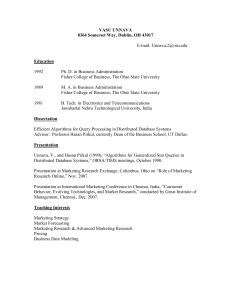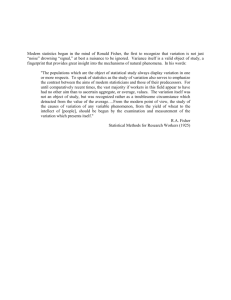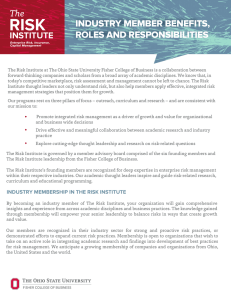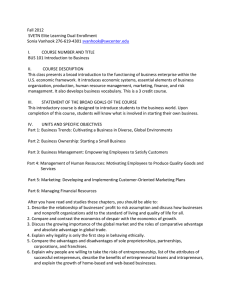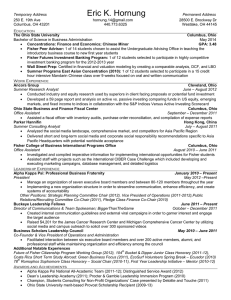BUSML894.81 Instructor: Michael Bills Digital Marketing
advertisement
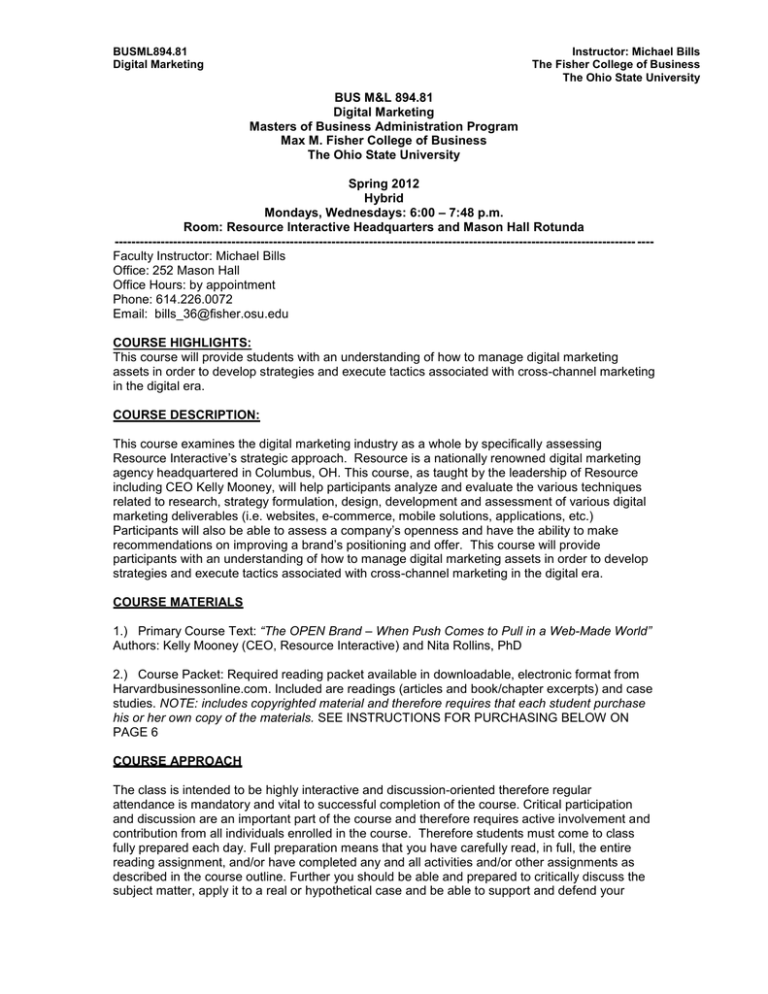
BUSML894.81 Digital Marketing Instructor: Michael Bills The Fisher College of Business The Ohio State University BUS M&L 894.81 Digital Marketing Masters of Business Administration Program Max M. Fisher College of Business The Ohio State University Spring 2012 Hybrid Mondays, Wednesdays: 6:00 – 7:48 p.m. Room: Resource Interactive Headquarters and Mason Hall Rotunda ----------------------------------------------------------------------------------------------------------------------------- ---Faculty Instructor: Michael Bills Office: 252 Mason Hall Office Hours: by appointment Phone: 614.226.0072 Email: bills_36@fisher.osu.edu COURSE HIGHLIGHTS: This course will provide students with an understanding of how to manage digital marketing assets in order to develop strategies and execute tactics associated with cross-channel marketing in the digital era. COURSE DESCRIPTION: This course examines the digital marketing industry as a whole by specifically assessing Resource Interactive’s strategic approach. Resource is a nationally renowned digital marketing agency headquartered in Columbus, OH. This course, as taught by the leadership of Resource including CEO Kelly Mooney, will help participants analyze and evaluate the various techniques related to research, strategy formulation, design, development and assessment of various digital marketing deliverables (i.e. websites, e-commerce, mobile solutions, applications, etc.) Participants will also be able to assess a company’s openness and have the ability to make recommendations on improving a brand’s positioning and offer. This course will provide participants with an understanding of how to manage digital marketing assets in order to develop strategies and execute tactics associated with cross-channel marketing in the digital era. COURSE MATERIALS 1.) Primary Course Text: “The OPEN Brand – When Push Comes to Pull in a Web-Made World” Authors: Kelly Mooney (CEO, Resource Interactive) and Nita Rollins, PhD 2.) Course Packet: Required reading packet available in downloadable, electronic format from Harvardbusinessonline.com. Included are readings (articles and book/chapter excerpts) and case studies. NOTE: includes copyrighted material and therefore requires that each student purchase his or her own copy of the materials. SEE INSTRUCTIONS FOR PURCHASING BELOW ON PAGE 6 COURSE APPROACH The class is intended to be highly interactive and discussion-oriented therefore regular attendance is mandatory and vital to successful completion of the course. Critical participation and discussion are an important part of the course and therefore requires active involvement and contribution from all individuals enrolled in the course. Therefore students must come to class fully prepared each day. Full preparation means that you have carefully read, in full, the entire reading assignment, and/or have completed any and all activities and/or other assignments as described in the course outline. Further you should be able and prepared to critically discuss the subject matter, apply it to a real or hypothetical case and be able to support and defend your BUSML894.81 Digital Marketing Instructor: Michael Bills The Fisher College of Business The Ohio State University perspective to the class. Successfully completing this course requires that you are willing and able to make such a commitment for preparation of this type and level. COURSE REQUIREMENTS & GRADING Standards of Integrity and Conduct: each student in this course is expected to be familiar with and abide by the principles and standards set forth in The Ohio State University’s code of student conduct and code of academic conduct. You can review these documents or download a .pdf version at: http://studentaffairs.osu.edu/resource_csc.asp and http://www.gradsch.osu.edu/Content.aspx?Content=10&itemid=1 It is also expected that each student will behave in a manner that is consistent with the Fisher Honor Statement, which reads as follows: “As a member of the Fisher College of Business Community, I am personally committed to the highest standards of behavior. Honesty and integrity are the foundations from which I will measure my actions. I will hold myself accountable to adhere to those standards. As a future leader in the community and business environment, I pledge to live by these principles and celebrate those who share these ideals.” While most students have high standards and behave honorably, like every academic institution we sometimes encounter cases of academic misconduct. It is the obligation of students and faculty to report suspected cases of academic and student misconduct. Students can report suspected violations of academic integrity or student misconduct to faculty or to a program’s leadership. All reported cases of academic misconduct are actively pursued and confidentiality is maintained. Grading Policy and Practices: With the objective of establishing as dynamic and effective a learning environment as possible, the course requires a commitment on your part not only to attend all classes, but also to prepare fully and to participate. We will work together to create an environment in which open, rigorous discourse is the standard. Thus, each of you must be willing not only to share your ideas and analysis with your colleagues, but also be open to challenges of those ideas. The following are the fundamental principles for grading in this course: The requirements for this course are identical for everyone. This means it is not possible to “make up” for poor performance through “extra credit” work. Any exams cannot be retaken or taken at times other than the scheduled period except under circumstances of extreme hardship and as approved by the instructor. As required by school policy, grading will be based on relative rather than absolute standards. The average grade in this course will be a 3.5 or lower. A “B” (3.00) average in core courses and overall is required to earn a Fisher MBA degree from The Ohio State University. It is possible to earn any of the official OSU grades, from an “A” to an “E”, in this course. Sometimes cases of academic misconduct arise due to apparent confusion over the degree of collaboration allowed on assignments. University policy clearly states that it is BUSML894.81 Digital Marketing Instructor: Michael Bills The Fisher College of Business The Ohio State University each student’s responsibility to resolve issues that appear ambiguous directly with the faculty members. However, to help create clarity and avoid potential misunderstandings, we use the following letters to indicate collaboration allowed on each assignment: N: No Collaboration of Any Kind Allowed T: Collaboration Only with Teammates Allowed A: Collaboration with All Fellow Students Allowed U: Unlimited collaboration with All Fellow Students and Other Parties Allowed There are 200 possible points to be earned through assignments for this course. Points are allocated as follows: • Class Participation - contribution to discussion: 60 points (U, collaboration with all fellow students) -Value: 30% of overall grade. • Team Assignment/Group Project (1): 80 points total includes impact of peer assessment (see below) (T, team only) - Value: 40% of overall grade. • Mid-Term Exam: Test: 60 points (N, no collaboration) - Value: 30% of overall grade. Class Collaboration: Participation and contribution are extremely important. Participation on all forum discussions is mandatory. Most of your learning will occur in preparation for and participating in the case discussions. The course is designed to allow cumulative insights of your colleagues to contribute to the evolution of the class’s learning. Thus the entire in-class learning experience relies on each of you taking responsibility for contributing to the discussion. Class contribution will comprise a significant portion of your grade. As is the case in real-world work environments, you are judged by what you contribute. Even if you feel that you know the material, unless you share your insights with the class, no one can adequately evaluate your preparedness and contribution. It is only through consideration of many diverse opinions and viewpoints that we will move toward a greater shared understanding of the multi-dimensional and horizontal material that this course includes. Each day I may ask one or more individuals to “open” the discussion with a summary of the key issues along with his or her analysis of those issues on the course Discussion Forum. It is important that each of you be prepared to respond to the invitation to open discussion. In the unlikely event that you are not prepared for class, then please let me know beforehand so that we might spare both of us the embarrassment of the class waiting for your post. You should be able to identify the key issues, problems and/or opportunities discussed in the article or case, to articulate and evaluate alternate approaches or perspectives, and to describe your view. It is important to appreciate that every student is an important participant in the class discussion, and that it is equally important that each of us listen carefully to one another and attempt to build on or constructively critique prior comments. Please resist the temptation to jump to topics that are not specifically open for discussion. It is also important to note that you are rewarded for your contribution, not just for your participation. Your contribution score will be based on how much you contribute to the class’s learning, not just by how much you talk in class. Some of the specific things that will have an impact on effective class participation and on which you will be evaluated include: A willingness to take intellectual risks and to test new ideas, rather than contributing only “safe” comments (e.g. repetition of facts from cases or readings without analysis or conclusions or repeating comments that have already been made by someone else.) Contribution of points that are relevant to the discussion. Are they linked to comments of others and to the themes that the class is exploring together? BUSML894.81 Digital Marketing Instructor: Michael Bills The Fisher College of Business The Ohio State University Do the comments add to our understanding of the situation? Are they incisive? Do they cut to the core of the problem? Is there a willingness to challenge the ideas that are being expressed in a compelling and intellectually sound manner? Does the participant integrate material from the past classes or the readings where appropriate? DO the comments reflect cumulative learning over the course and the MBA curriculum, or does the participant merely consider each case in isolation? Is theoretical material applied effectively and appropriately? Finally, I understand that for some participating in class can be an intimidating experience initially, so having a hybrid learning experience should help all learners. A hybrid allows for both synchronous and asynchronous learning opportunities. Attendance: It is imperative that each of you arrives to the synchronous activities on time and fully prepared each day. Late arrival or unannounced and unapproved absence will not be tolerated. This course features guest lectures from executive level professionals of Resource Interactive; therefore, it is unacceptable, unprofessional, and disrespectful to take advantage of their time and contribution by arriving late to their presentations. Group Project: A document detailing the group project is located at the end of this syllabus. The Group Project is to be conducted in your assigned teams. The team deliverable will be a power point presentation. Each team member will be assigned the same marks. Following the delivery and presentation there will be a peer assessment survey of individual contributions to team efforts. The outcome of the assessment can cause an individual’s score to be raised or lowered. Group projects will be due 24 hrs. prior to the beginning of the class on the assigned dates. Disability Policy: Students with disabilities or requiring special accommodations should work directly with The Ohio State University Office of Disability Services (ODS). ODS is located in 150 Pomerene Hall. The ODS phone number is (614) 292 - 3307. Grade Appeal Policy: Grades on exams and assignments are intended to reflect the overall quality of performance of the student(s). If you think your grade on an exam or assignment does not reflect the quality of your performance, you may submit a clear, written explanation of your reasoning within one week following the return of your assignment or test. The written document need not be long but it must clearly identify the problem or issue of concern. I will carefully consider all such appeals. There will be no grading appeals after the one-week deadline has expired. OFFICE APPOINTMENTS I will be available to discuss any concerns to you on an individual basis either after synchronous meetings or in my office. You may arrange mutually agreeable time to meet by emailing me. So that I am prepared please specify in your email, the general topic that you would like to discuss so that I may be prepared and so that we can maximize the effectiveness of our meeting. Meetings are typically scheduled in 15-minute windows. If you believe you require more time, please request a longer appointment. NOTE: All readings, including text chapters, articles, and cases as well as assignments are to be submitted, and/or read, studied, critically considered and completed PRIOR to the date and time listed in each week’s course description. Assignments are to be submitted electronically to CARMEN on the day they are due. BUSML894.81 Digital Marketing Instructor: Michael Bills The Fisher College of Business The Ohio State University The schedule and listed “Module Navigation” is intended to provide all pertinent dates and the timing of required assignments, tests, and readings as well as the sessions featuring guest lecturers. To order the readings, cases and articles available from Harvard Business Online please follow the directions provided below. Any additional readings and chapters will be provided as handouts on the first day of class unless otherwise noted as a free, online download. To order the cases and articles as electronic downloads click on the link below to order the course materials: http://cb.hbsp.harvard.edu/cb/access/13010553 If you have not registered with Harvard Business Online, you will be required to do so. This URL will provide you with a list of required materials for use in this course. Note that product formats may differ; some may require that a hard copy be shipped to you via airmail. Electronic course materials are in PDF (Portable Document Format) and should be viewed with Adobe Reader, available free at www.adobe.com. Students can access PDF files of course materials via a link on Harvard Business Online for six months from the date of purchase. You will have immediate access to the materials upon placing your order, for subsequent access, you must login to http://harvardbusinessonline.org I hope you find this a convenient way to access your course materials. For technical assistance, please view the Quick Tips section or contact Harvard Business School Publishing at 1-800-8108858 or 617-783-7700. They are open 8am-6pm Eastern Standard Time. They can also be reached at techhelp@hbsp.harvard.edu BUSML894.81 Digital Marketing Instructor: Michael Bills The Fisher College of Business The Ohio State University SCHEDULE WEEK ONE: UNDERSTANDING THE DIGITAL CONSUMER & THE DIGITAL MARKETPLACE Module 0: Asynchronous (online) PRE-COURSE OVERVIEW (Nancy Kramer, Chairwoman & Chief Culture Officer, Michael Bills, Executive Director, Innovation Initiative and course instructor, The Fisher College of Business) PRE-COURSE OVERVIEW - Introduction to learning objectives, course topics, subject matter, expectations, and assignments The “R.I. Reel” video (http://www.youtube.com/watch?v=kyzClXxsk68), “The Future of Shopping” video (http://www.youtube.com/watch?v=h0N-mkuK_DI) The “Resource interactive: Manifesto” video (http://www.youtube.com/watch?v=NgNnUGsgIMA ). READING ASSIGNMENT: First half of The O.P.E.N. Brand, and come to class prepared to participate in critical discussion ONLINE FORUM: Prepare questions to be posed to the authors of the OPEN Brand Module 1: Synchronous (in-class) – @ Resource (6:00-7:48 p.m.) (Monday, March 26). INTRODUCTION TO THE OPEN BRAND (Kelly Mooney, CEO) – profiling Resource's thought leadership regarding the prioritization of on-demand, personalized, engaging and networked solutions. INTRODUCTION TO THE OPEN BRAND (Nita Rollins, Futurist) o Organize Teams Module 2: Asynchronous (online) (completed by Friday of week one) CONSUMER EXPERIENCE JOURNEY (Tip Rose, Executive Director Retail) – a review of the traditional purchase funnel, how digital is disrupting it and what tactics can be deployed to take advantage. o Consumer Insights (Mila Goodman, Executive Director of Strategy & Experience) o Future foresights/trends (Nita Rollin, Futurist) o RI Labs/Tech capabilities (Dan Shust, Executive Director of Emerging Media, RI:Lab) READING ASSIGNMENT: Branding in the Digital Age, by David Edelman, HBR December 2010; Finish reading The O.P.E.N Brand. ONLINE, ASYNCHRONOUS TEAM DISCUSSION– to be completed by Friday of week one. BUSML894.81 Digital Marketing Instructor: Michael Bills The Fisher College of Business The Ohio State University WEEK TWO: DIGITAL COMMERCE – e-commerce, everywhere commerce – owned digital media Module 3: Asynchronous (online) DIGITAL COMMERCE OVERVIEW (Laura Evans, VP, Digital Commerce) – overview of digital commerce and the art and science of successful online retailing. o o Reading Assignment: Era of Agile Commerce, by Brian Walker, Forrester, May 2011 Reading Assignment: Barnes & Noble case by Jeffery Rayport, Dickenson Louie, February 1, 2001 Module 4: Asynchronous (online) DIGITAL COMMERCE DELIVERY (Klay Huddleston, VP Retail) – discussion on the operational components for delivering upon the promise of digital commerce o o Reading Assignment: The eBusiness Innovation Imperative, by Sheen Noble, Forrester, April 29, 2011 Reading Assignment: E-Commerce at Williams-Sonoma (Case), by Rosabeth Moss Kantor, Daniel Galvin, February 24, 2000 ONLINE, ASYNCHRONOUS TEAM DISCUSSION– to be completed by Friday of week two. WEEK THREE: DIGITAL MEDIA Module 5: Asynchronous (online) DIGITAL MEDIA OVERVIEW (Lora Schaeffer, VP Social Media & Marketing) – overview of digital media and the delineation between paid, owned and earned media. o Reading Assignment: The Future of Advertising, By Danielle Sacks, Fast Company, November 17, 2010 http://www.fastcompany.com/magazine/151/mayhem-on-madison-avenue.html o Reading Assignment: Online Marketing at Big Skinny (Case), by Benjamin Edelman and Scott Kominers, February 8, 2011 Module 6: Asynchronous (on-line) PAID MEDIA OVERVIEW (Mallory Moore, Media Manager) – A deep dive into “paid media” and how digital has enabled marketers to develop performance-based plans to target the consumer like never before. o Reading Assignment: The Year of Marketing Dangerously, by Christopher Meyer, October 1, 2008 o Reading Assignment: “MedNet.com Confronts ‘Click-Through’ Competition” (Case) by Allegra Young, April 20, 2007 ONLINE, ASYNCHRONOUS TEAM DISCUSSION– to be completed by Friday of week three BUSML894.81 Digital Marketing Instructor: Michael Bills The Fisher College of Business The Ohio State University WEEK FOUR: DIGITAL MEDIA CONTINUED Module 7: Asynchronous (on-line) EARNED MEDIA (Lora Schaeffer, VP Social Media & Marketing) – A deep dive into “earned media” and how the role of social media has evolved to become a critical component of any media plan. o Reading Assignment: Does Social Media Have A Return On Investment?, By Farhad Manjoo, Fast Company, June 22, 2011 http://www.fastcompany.com/magazine/157/joe-fernandez-klout-social-media o Reading Assignment: UnME Jeans: Branding in Web 2.0 (Case) by Thomas Steenburgh and Jill Avery, November 12, 2008 Module 8: Online Synchronous EXAM ONLINE, ASYNCHRONOUS TEAM DISCUSSION– to be completed by Friday of week five WEEK FIVE: MOBILE & ANALYTICS Module 9: Asynchronous (on-line) MOBILE (Stephen Burke, VP Mobile) – diversification of delivery and consumption of online marketing, SMS campaigns and mCommerce. o Reading Assignment: Major League Baseball Advanced Media: America’s Pastime Goes Digital (Case) by Anita Elberse and Brett Laffel, March 20, 2010 o Reading Assignment: How Internet Standards Will Finally Deliver a Mobile Revolution by Bengi Korkmaz, Richard Lee & Ickjin Park (McKinsey Quarterly) http://www.mckinseyquarterly.com/How_new_Internet_standards_will_finally _deliver_a_mobile_revolution_2788 Module 10: Asynchronous (on-line) MEASUREMENT & ANALYTICS (Tim Wilson, Director Measurement and Analytics) – data mining, consumer segmentation, measurement, and risk management o Reading Assignment: The Web Analytics Maturity Model: A strategic approach based on business maturity and critical success factors, by Stéphane Hamel http://immeria.net/oamm/WAMM_ShortPaper_091017.pdf o Reading Assignment: The Ford Fiesta, John Deighton, Leora Kornfeld ONLINE, ASYNCHRONOUS TEAM DISCUSSION– to be completed by Friday of week five BUSML894.81 Digital Marketing Instructor: Michael Bills The Fisher College of Business The Ohio State University WEEK SIX: INTEGRATING & APPLYING COURSE LEARNING Module 11: Synchronous (in-class) Monday, April 30, 2012 6 pm TEAM PROJECT PRESENTATION GROUP /TEAM PROJECT ASSIGNMENT/PRESENTATIONS Working as a team of 5, and utilizing learning from the course thus far, research, identify and develop a final presentation AND formal deliverable power point, prezi, keynote or equivalent (of no more than 25 pages in length) detailing the most optimal example of a major brand and company of any type, and from any industry vertical in need of deploying new digital processes, theories and practices taught in the course and “the O.P.E.N. Brand”. Describe how the selected company could and should employ specific digital processes and practices in order to increase and improve awareness, loyalty and revenues. Specifically conduct an O.P.E.N. assessment. Conduct secondary research into the company’s structure, leadership, culture and operations. Review and ultimately cite published accounts of the organization’s approach to digital marketing and commerce, analysts’ reports and/or other published opinions and perspectives regarding the competitive nature of the organization’s offer, its strengths, and weaknesses. Utilizing frameworks, models and philosophies from the course, explain how the company and business you select, could leverage these theories and tools in order to more successfully leverage the digital space on behalf of shareholders and consumers/customers. INTRODUCTION RATONALE - including but not limited to: - CURRENT STATE – financial results (market-share growth, sales, etc) and current performance of direct marketing and selling efforts - RECOMMENDATIONS - modifications and/or additions to the digital marketing and selling efforts that would benefit the organization - CONSUMER BENEFITS –potential emotional and rational benefits and potential increases in affinity & loyalty resulting from these benefits - SUSTAINABLE POINTS OF COMPETITVE DIFFERENTIATION - how these recommendations can assist the brand in increasing long –term sustainability and viability - CREATION PROCESS – any specific recommended steps for creating the optimal brand and consumer experience -SUMMATION: other interesting points or perspectives on the product or service direction you would recommend. Each team will present its assignment and will be strictly limited to 10 (ten) minutes, followed by a 5 minute Q&A period. The instructors and each student will rate your presentation and evaluate the quality of your submission. A scorecard/evaluation form will be supplied with the syllabus.
